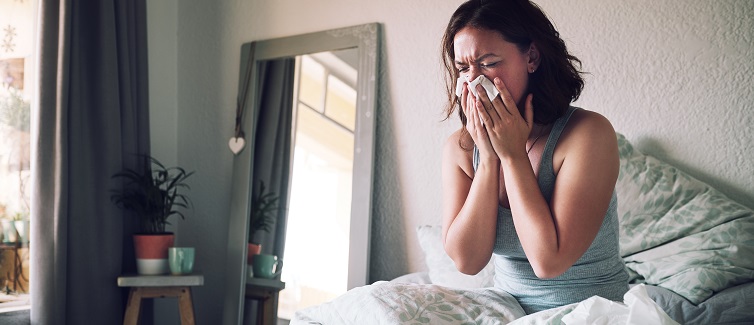This spring and early summer, you noticed it: Every time you walked out the door, you began sneezing. Your eyes watered, your nose itched, and your head felt stuffy. In short, your allergies seemed worse than usual.
Are Seasonal Allergies Bad This Year?
It’s not your imagination: The allergy season of 2021 has been brutal. So were the past few years. In fact, a 2020 University of Wisconsin study indicated allergy season has been getting longer and stronger for the past 30 years.
Scientists blame climate change. Rising temperatures mean fewer days of frost in the spring. Plants bloom earlier, which results in more pollen in the air, which in turn means more intense allergy seasons.
Never Miss a Beat!
Subscribe to Our HealthBeat Newsletter!
Thank you for subscribing!
You can now select the specific newsletters you'd like to receive.
You are already subscribed.
Subscribe to more newsletters in our email preference center.
Sorry, an error occurred. Please try again later.
Get Healthy Tips Sent to Your Phone!
What Pollen Allergies Do People Suffer From During Allergy Season?
Airborne pollen from trees, weeds, and grasses causes allergies. Spores from mold can also trigger seasonal allergies. Plants fertilized by bees and other insects do not cause pollen allergy symptoms.
Common allergens include:
- Birch
- Cedar
- Oak
- Ragweed
- Sagebrush
- Tumbleweed
When Does Allergy Season Start?
Depending where you live, allergy season can begin as early as February. It can last well into the fall. Different allergens appear in various parts of the U.S.
In general, they follow this timetable, according to The American College of Allergy, Asthma, and Immunology.
- Early spring: In February, March and April, tree pollen begins to appear.
- Late spring to mid-summer: From May through July, trees, grass, and weeds all produce pollen.
- Late summer: From August to October or November, ragweed is the main cause of seasonal allergies.
What Problems Do Pollen Allergies Cause?
Exposure to pollen causes several common conditions.
Hay fever
Also called allergic rhinitis, hay fever can be mild or severe, and it is very common. The Centers for Prevention and Disease Control (CDC) estimates that 60 million people in the U.S. suffer from hay fever.
Hay fever happens when allergens like pollen enter your body. Your immune system thinks they’re a threat and begins producing histamines. The histamines trigger sneezing, watery eyes, and other symptoms.
Allergic conjunctivitis
If your eyes get red and itchy during pollen season, you might have allergic conjunctivitis. It’s a form of pinkeye caused by allergens in the air. One-third of the population suffers from allergic conjunctivitis.
Asthma
People who already suffer from asthma can be more sensitive to pollen. You’re more likely to have an asthma attack when pollen counts are high.
Can You Develop Seasonal Allergies as an Adult?
You can develop seasonal allergies at any time in your life, including adulthood. You can even become allergic to something you’ve never been allergic to before.
It’s not always clear why some adults develop new allergies. Some reasons for adult-onset seasonal allergies could be:
- Reduced immune function. If you’re sick, pregnant, or immunocompromised, you might be more susceptible to allergens.
- Moving to a new area of the country. You might be around trees or other plants you haven’t encountered before.
- Having greater exposure to allergens. A small amount of pollen may not bother you. But concentrated exposure (i.e. a hiking trip) could trigger an allergic reaction.
What Are Seasonal Allergy Symptoms?
Seasonal allergy symptoms can range from mild to severe. They include:
- Congestion
- Coughing
- Fatigue
- Headache
- Itchy eyes, ears, or nose
- Itchy skin or a rash
- Red eyes (allergic conjunctivitis)
- Runny nose
- Sneezing
- Shortness of breath
- Sore throat (from post-nasal drip)
- Watery eyes
What Treatment is Available for Seasonal Allergy Symptoms?
You can reduce seasonal allergy symptoms by following these tips:
- Stay indoors on high pollen count days.
- Take over-the-counter antihistamines such as Claritin, Zyrtec, or Allegra.
- Use a high efficiency particulate air (HEPA) purifier.
- Keep your windows closed and use air conditioning.
- Start taking allergy medicine before pollen season begins. Doing so will help block inflammation before it begins, and make your symptoms easier to control.
- Shower before going to bed to remove allergens.
- Wash your sheets and other bedding in hot, soapy water weekly.
- Wear a hat and sunglasses outdoors to limit pollen exposure.
- Change clothes when you come indoors.
- Take over-the-counter antihistamines such as loratadine (Claritin), cetirizine (Zyrtec), or fexofenadine (Allegra).
- Use eye drops such as Opcon A or Patanol (olopatadine) for eye symptoms. Consider nasal sprays such as fluticasone (Flonase) or azelastine (Astelin) for sneezing and nasal congestion symptoms.
For concerns about allergies, visit UPMC Urgent Care. For more severe allergy or asthma symptoms, you should see your doctor. A skin-prick test can pinpoint the cause of your seasonal allergies. Your doctor may prescribe immunotherapy shots to build up your immunity to your allergy triggers.
About Urgent Care
Sometimes you need care right away, with no time to wait for an appointment. That’s where UPMC Urgent Care comes in. We offer prompt treatment for illnesses and injuries seven days a week, with no appointment necessary. With locations throughout Pennsylvania and Maryland, you can find immediate care close to you – even if your doctor’s office is closed. Our services include treatment for minor injuries and illnesses, physicals, prescription filling, and flu shots and immunizations. Wait times for minor injuries and illnesses are usually shorter than the Emergency Department, and we accept most major insurance. Visit our website to find a location close to you.
